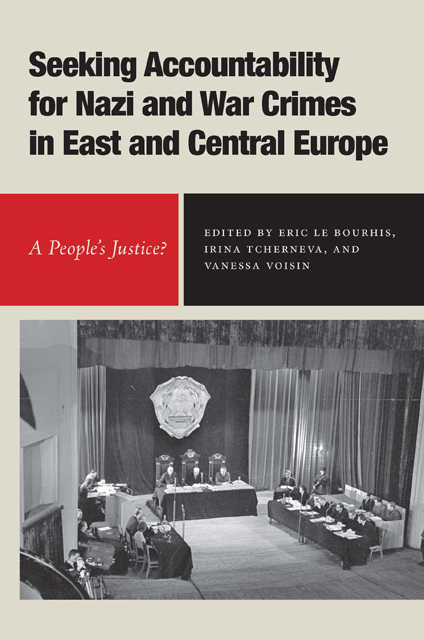Introduction
Published online by Cambridge University Press: 20 December 2022
Summary
Wait! Wait! Stop! You want to put an end to them?
A minute or two, and it would be over?
For Levnjuk, for Olena, for my Vasja, for our children, for all those who were murdered, in two minutes they would have paid?
No! Let them wait for their fate. Let them drink their punishment to the dregs.
Ah, women, those of them who will die now will do very well.
Ah, no! Let them rather wait for the hour when their own wives and children will turn away from them and say, “No, they were not our fathers!”
Let them answer for our misfortune and torment before the People’s Court.
Let the anger of the people fall upon their heads!
And may the earth refuse them, the damned!
—Final diatribe of Feodosia in the film Rainbow, dir. Mark Donskoy, Kiev Studio, 1944The resort to international criminal justice after the Second World War has recently been reassessed by a body of creative scholarship that is looking into the foregrounding attempts to design an international justice, transnational dynamics, or longer-term processes. The emergence of new legal definitions and judicial instances (e.g., International Military Tribunal of Nuremberg and IMT for the Far East) has been increasingly studied within a wider framework, both in time and in space, without losing its unique character, while the respective parts played by the governments and the professional actors directly involved have acquired further nuance and deliberation.
Yet the year 1943 remains a turning point, when the idea of resorting to justice to legally qualify and punish the crimes committed by the Nazi occupiers and their local accomplices was asserted and effectuated. Admittedly, the St. James Declaration that the Allied powers signed in January 1942 had already expressed their collective appreciation of the particularity of the violence deployed by the occupier in Europe. It also affirmed their determination in the future to punish severely these infringements of extant rights and customs of war as well as of the international conventions adopted since the middle of the nineteenth century that governed wartime behavior. But the Soviet success at Stalingrad also marked a turning point in this respect: not even waiting for final victory, the governments in exile in London and Stalin in Moscow passed the first laws to punish invaders and indigenous traitors found guilty of unprecedented crimes against the nation.
- Type
- Chapter
- Information
- Seeking Accountability for Nazi and War Crimes in East and Central EuropeA People’s Justice?, pp. 1 - 26Publisher: Boydell & BrewerPrint publication year: 2022



